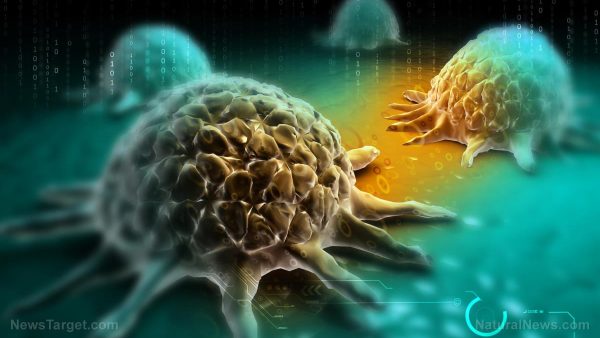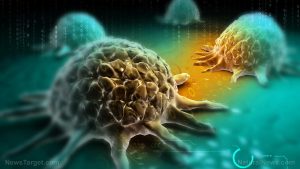
Alveolar rhabdomyosarcoma – causes, side effects and treatments at NaturalPedia.com
Wednesday, January 03, 2018 by Ralph Flores
http://www.naturalpedia.com/alveolar-rhabdomyosarcoma-causes-side-effects-and-treatments-at-naturalpedia-com.html

Rhabdomyosarcoma (RMS) is a type of cancer that affects cells that develop into skeletal muscle – a muscle used to move parts of our body. RMS is more common in children, as rhabdomyoblasts, the cell that is affected by RMS, is formed during the development of the embryo. However, there have been occasional reports of this type of cancer developing in adults.
Alveolar rhabdomyosarcoma (ARMS) is a type of sarcoma (cancer developing from connective tissues) that affects older children and teens. This usually is found in large muscles of the trunk, arms, and legs. Like other forms of sarcoma, ARMS can develop rapidly and may require intensive treatment.

Known side effects of alveolar rhabdomyosarcoma
According to experts, the predisposing factors for ARMS can be linked to the following:
- Inherited genetic defects
- Drug use by the mother while pregnant
- Carcinogens
- Inherited predisposition such as Li-Fraumeni syndrome
- Other genetic disorders upon birth (these may include Costello syndrome, neurofibromatosis, and Noonan syndrome)
It is important to point out that risk factors do not immediately mean that you will have the condition.
The etiology of ARMS is unknown. Studies have suggested it to be from genetic mutation to hereditary conditions.
Initial stages of ARMS do not show any symptoms. This type of cancer can appear anywhere in the body and symptoms may manifest depending on where the mass is located and how large it is. Depending on where it is, the following cases may be observed:
- Tumors that appear in the neck, chest, back, limbs, or groin may first appear as a swelling. This may cause pain, redness or other problems.
- Tumors that appear around the eye can cause it to bulge out or make the child appear cross-eyed. Vision may be affected as well.
- Tumors that appear in the ear may cause headaches or sinus congestion.
- Tumors that appear in the prostate can lead to blood in the urine or vaginal bleeding if it appears in the vagina.
Tumor growth may affect other organs as well, as their growth will obstruct them any may lead to impairment of function. Lesions may also appear in the hands and feet, the spine region, nose, and pelvis. It can be found in the abdomen and under the skin as well.
Organs affected by alveolar rhabdomyosarcoma
Alveolar rhabdomyosarcoma commonly occurs in the skeletal muscle of the hands and feet, but it can appear in other parts such as the trunk, head, and neck. This will then spread to other areas of the body, including bone marrow, distal nodes, and bone.
Food items or nutrients that may prevent alveolar rhabdomyosarcoma
The chances of developing ARMS, like all forms of cancer, may be reduced based on what we eat. A diet containing fresh and steamed vegetables, rice and whole grains, and plant-based milk is recommended. Start your day by consuming citrus, preferably the juice of a whole lemon in warm water with no sugar, and wait for 20 minutes before consuming anything else. For breakfast, include chia, spirulina seaweed, and pineapple, then, drink aloe juice with carrots at midday.
Avoid all forms of junk food, processed food, and added sugars, and skip eating cow’s milk, cheeses, white flour, and red meat.
Treatment and management options for alveolar rhabdomyosarcoma
The normal courses of treatment for ARMS are chemotherapy and radiotherapy, aside from medication. Some treatments include:
- Surgery – Before surgery is performed, its effects on the body must be considered. In most cases of rhabdomyosarcoma, excision of the tumor may not be possible as these may have already affected a wide area.
- Chemotherapy – Dosage varies on the severity of the development of ARMS in the body.
- Radiation therapy – this method uses high energy beams to kill cancer cells.
Where to learn more
- Young mom learns she may die of cancer after doctor misdiagnosed and put her through unnecessary chemo
- CancerCauses.news
- Nutrients.news
- DangerousMedicine.com
- BigPharmaNews.com
Summary
Alveolar rhabdomyosarcoma is a type of cancer that hits cells that develop into skeletal muscle. This type of cancer is common in older children. Moreover, symptoms appear at advanced stages and can prove to be difficult to address. Still, there are foods that can be consumed to prevent the alveolar rhabdomyosarcoma.
Sources include:
Tagged Under: Tags: alveolar rhabdomyosarcoma





